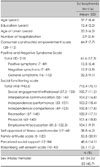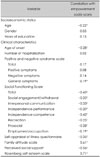Abstract
Objectives
To identify various factors that might affect the empowerment of outpatients with schizophrenia.
Methods
Of patients who had been receiving outpatient treatments at the department of psychiatry in Dong-A university hospital, 116 patients with a DSM-IV-TR diagnosis of stable schizophrenia were enrolled in this study. The empowerment, psychiatric symptoms, social functions, insight, family attitude, social support and self-esteem were assessed through an interview or self-report measures. Overall, multiple regression analyses were performed in consideration of 11 factors (age, sex, level of education, age of onset, frequency of hospitalization, symptoms, social functions, insight, family attitude, social support, self-esteem) as explanatory variables for the empowerment.
Results
Multiple regression analyses using a backward elimination revealed that the following four factors were found to be significant explanatory variables for the empowerment: age of onset, social functions, family attitude and self-esteem. A coefficient of determination for these four explanatory variables was 0.65.
Conclusion
In conclusion, the results showed that four factors, such as age of onset, social functions, family attitude and self-esteem, were found to be significant explanatory variables for the empowerment of outpatients with schizophrenia. Since these four variables accounted for 65% of total empowerment, however, further studies in a larger group of patients are warranted to identify other potential factors for the empowerment.
Figures and Tables
References
1. Andreasen NC, Carpenter WT Jr, Kane JM, Lasser RA, Marder SR, Weinberger DR. Remission in schizophrenia: proposed criteria and rationale for consensus. Am J Psychiatry. 2005; 162:441–449.

2. Hawk AB, Carpenter WT Jr, Strauss JS. Diagnostic criteria and five-year outcome in schizophrenia. A report from the international pilot study of schizophrenia. Arch Gen Psychiatry. 1975; 32:343–347.

3. Carpenter WT, Bartko JJ, Strauss JS, Hawk AB. Signs and symptoms as predictors of outcome: A report from the international pilot study of schizophrenia. Am J Psychiatry. 1978; 135:940–944.

4. Tsuang MT, Woolson RF, Fleming JA. Long-term outcome of major psychoses. I. Schizophrenia and affective disorders compared with psychiatrically symptom-free surgical conditions. Arch Gen Psychiatry. 1979; 36:1295–1301.
5. Harrison G, Croudace T, Mason P, Glazebrook C, Medley I. Predicting the long-term outcome of schizophrenia. Psychol Med. 1996; 26:697–705.

6. Siegel SJ, Irani F, Brensinger CM, Kohler CG, Bilker WB, Ragland JD, et al. Prognostic variables at intake and long-term level of function in schizophrenia. Am J Psychiatry. 2006; 163:433–441.

7. Torgalsboen AK, Rund BR. “Full recovery” from schizophrenia in the long term: A ten-year follow-up of eight former schizophrenic patients. Psychiatry. 1998; 61:20–34.

8. Lauronen E, Miettunen J, Veijola J, Karhu M, Jones PB, Isohanni M. Outcome and its predictors in schizophrenia within the Northern Finland 1966 Birth Cohort. Eur Psychiatry. 2007; 22:129–136.

9. Bachmann S, Bottmer C, Schroder J. One-year outcome and its prediction in first-episode schizophrenia-a naturalistic study. Psychopathology. 2008; 41:115–123.

10. Bellack AS. Scientific and consumer models of recovery in schizophrenia: Concordance, contrasts, and implications. Schizophr Bull. 2006; 32:432–442.

11. Mead S, Copeland ME. What recovery means to us: consumers' perspectives. Community Ment Health J. 2000; 36:315–328.
12. Deegan PE. Recovery as a self-directed process of healing and transformation. Occup Ther Ment Health. 2002; 17:5–21.

13. Liberman RP, Kopelowicz A, Ventura J, Gutkind D. Operational criteria and factors related to recovery from schizophrenia. Int Rev Psychiatry. 2002; 14:256–272.

14. Anthony WA. Recovery from mental illness: the guiding vision of the mental health service system in the 1990s. Psychosocial Rehabil J. 1993; 16:11–23.

16. Slade M, Amering M, Oades L. Recovery: an international perspective. Epidemiol Psichiatr Soc. 2008; 17:128–137.

17. Andresen R, Oades L, Caputi P. The experience of recovery from schizophrenia: towards an empirically validated stage model. Aust N Z J Psychiatry. 2003; 37:586–594.

18. Leamy M, Bird V, Le Boutillier C, Williams J, Slade M. Conceptual framework for personal recovery in mental health: systematic review and narrative synthesis. Br J Psychiatry. 2011; 199:445–452.

19. Braithwaite R, Bianchi C, Taylors S. Ethnographic approach to community organization and health empowerment. Health Educ Q. 1994; 21:407–416.

20. Beeker C, Guenther-grey C, Raj A. Community empowerment paradigm drift and the primary prevention of HIV/AIDS. Soc Sci Med. 1998; 46:831–842.

21. Gutierrez L. Working with women of color: An empowerment perspective. Soc Work. 1990; 35:149–153.
22. Kubiak SP, Siefert K, Boyd CJ. Empowerment and public policy: An exploration of the implications of Section 115 of the personal responsibility and work opportunity Act. Am J Community Psychol. 2004; 32:127–143.

23. Fawcett SB, White G, Balcazar F, Suarez-Ballcazer Y. A contextual-behavioral model of empowerment: Case studies involving people with physical disabilities. Am J Community Psychol. 1994; 22:471–496.

24. Andrews GJ. Private complementary medicine and older people: Service use and user empowerment. Ageing Soc. 2002; 22:343–368.

25. Young AS, Forquer SL, Tran A, Atarzynski M, Shatkin J. Identifying clinical competencies that support rehabilitation and empowerment in individuals with severe mental illness. J Behav Health Serv Res. 2000; 27:321–333.

26. Stromwall LK, Hurdle D. Psychiatric rehabilitation: An empowerment-based approach to mental health services. Health Soc Work. 2003; 28:206–213.

27. Flemming Cottrell RP, Langzettel M. Identifying dimensions of empowerment in consumers of psychiatric services. Occup Ther Ment Health. 2005; 21:13–38.

28. Schulz AJ. Empowerment as multi-level construct: Perceived control at the individual, organizational and community levels. Health Educ Res. 1995; 10:309–327.

29. Rappaport J. Terms of empowerment/exemplars of prevention: Toward a theory for community psychology. Am J Community Psychol. 1987; 15:121–148.

30. Segal SP, Silverman C, Temkin T. Measuring empowerment in client-run self-help agencies. Community Ment Health J. 1995; 31:215–227.

31. Rogers ES, Chamberlin J, Ellison ML, Crean T. A consumer-constructed scale to measure empowerment among users of mental health services. Psychiatr Serv. 1997; 48:1042–1047.

32. Kilian R, Lindenbach I, Lobig U, Uhle M, Petscheleit A, Angermeyer MC. Indicators of empowerment and disempowerment in the subjective evaluation of the psychiatric treatment process by persons with severe and persistent mental illness: A qualitative and quantitative analysis. Soc Sci Med. 2003; 57:1127–1142.

33. Liberman RP, Kopelowicz A. Recovery from schizophrenia: A concept in search of research. Psychiatr Serv. 2005; 56:735–742.

34. Yamada S, Suzuki K. Application of empowerment scale to patients with schizophrenia: Japanese experience. Psychiatry Clin Neurosci. 2007; 61:594–601.

35. McCabe R, Saidi M, Priebe S. Patient-reported outcomes in schizophrenia. Br J Psychiatry Suppl. 2007; 50:s21–s28.

36. American Psychiatric Association. Diagnostic and Statistical Manual of Mental Disorders. DSM-IV-TR. 4th ed. Washington DC: American Psychiatric Association;2000.
37. Yi JS, Ahn YM, Shin HK, An SK, Joo YH, Kim SH, et al. Reliability and validity of the Korean version of the positive and negative syndrome scale. J Korean Neuropsychiatr Assoc. 2001; 40:1090–1105.
38. Kim CK, Lee JA. Development of the korean version of the social functioning scale in the schizophrenics: A study on the reliability and validity. Korean J Biol Psychiatry. 2009; 16:76–111.
39. Marks KA, Fastenau PS, Lysaker PH, Bond GR. Self-appraisal of illness questionnaire (SAIQ): Relationship to researcher-rated insight and neuropsychological function in schizophrenia. Schizophr Res. 2000; 45:203–211.

40. Kavanagh DJ, O'Halloran P, Manicavasagar V, Clark D, Piatkowska O, Tennant C, et al. The family attitude scale: reliability and validity of a new scale for measuring the emotional climate of families. Psychiatry Res. 1997; 70:185–195.

41. Dahlem NW, Zimet GD, Walker RR. The multidimensional scale of perceived social support: A confirmation study. J Clin Psychol. 1991; 47:756–761.

42. Rosenberg M. Society and the adolescent self-image. Princeton, New Jersey: Princeton University Press;1965. p. 125–136.
43. Clemmensen L, Vernal DL, Steinhausen HC. A systematic review of the long-term outcome of early onset schizophrenia. BMC Psychiatry. 2012; 12:150.

44. Gibbons J, Horn S, Powell J, Gibbons J. Schizophrenic patients and their families. A survey in a psychiatric service based on a DGH Unit. Br J Psychiatry. 1984; 144:70–77.

45. Grandón P, Jenaro C, Lemos S. Primary caregivers of schizophrenia outpatients: Burden and predictor variables. Psychiatry Res. 2008; 158:335–343.

46. Jana AK, Ram D, Praharaj SK. Empowerment and its associations in schizophrenia: a cross-sectional study. Community Ment Health J. 2014; 50:697–701.

47. Drapalski AL, Medoff D, Dixon L, Bellack A. The reliability and validity of the Maryland assessment of recovery in serious mental illness scale. Psychiatry Res. 2016; 239:259–264.

48. Vaughn C, Leff JP. The measurement of expressed emotion in families of psychiatric patients. Br J Soc Clin Psychol. 1976; 15:157–165.

49. Yanos PT, Rosenfield S, Horwitz AV. Negative and supportive social interactions and quality of life among persons diagnosed with severe mental illness. Community Ment Health J. 2001; 37:405–419.
50. King S, Ricard N, Rochon V, Steiger H. Determinants of expressed emotion in mothers of schizophrenia patients. Psychiatry Res. 2003; 117:211–222.

51. Markowitz FE. The effects of stigma on the psychological well-being and life satisfaction of persons with mental illness. J Health Soc Behav. 1998; 39:335–347.

53. Staring AB, Van der Gaag M, Van den Berge M, Duivenvoorden HJ, Mulder CL. Stigma moderates the associations of insight with depressed mood, low self-esteem, and low quality of life in patients with schizophrenia spectrum disorders. Schizophr Res. 2009; 115:363–369.

54. Borras L, Boucherie M, Mohr S, Lecomte T, Perroud N, Huguelet P. Increasing self-esteem: efficacy of a group intervention for individuals with severe mental disorders. Eur Psychiatry. 2009; 24:307–316.





 PDF
PDF ePub
ePub Citation
Citation Print
Print





 XML Download
XML Download